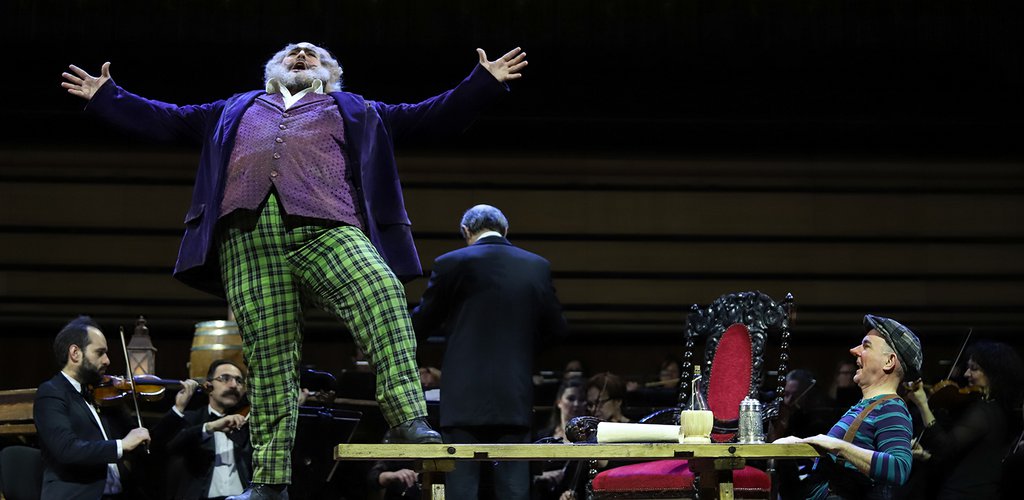Two fairies prance around Falstaff, and then return to their places in the orchestra to play the violin. This is a scene that stays with you for the rest of your life, unless you receive a serious blow to your head; but let us suppose you will not. To me, the Festival Orchestra’s rendition at Müpa Budapest was the Falstaff performance of a lifetime; it was also the opera performance of a lifetime, as they showed me something that I always knew existed, but which I only very rarely encountered. This was an opera whole and rounded: a work that is a complete whole even if the music, lyrics and stage are separate; it showed that it is possible to envision a performance where this wholeness does, in fact, exist. It showed me fairies playing the violin. And, in the previous act, I saw this man in a tuxedo sneaking around and singing, even though he had no problem a minute before and was in fact sitting with the orchestra and playing the cello. And Iván Fischer: who knows what exactly he is at this point: director, conductor, collaborator, spiritual father (or, most likely, all of the above).
You do have some expectations before the concert of what is to come: Great foreign singers and the sort of orchestral performance that no other theatre ensemble in Hungary could ever deliver. It would do any opera justice to have it performed at the Festival Orchestra standard, but this is especially important in the case of Falstaff; there are too many things – and too many interesting things – happening in the orchestra pit, and it is these which propel the piece forward. They also provide the illustration and make the audience laugh; they have weight, they make sense and they play a role. It is as though Verdi were just beginning his career; or if he were starting anew, and were just coming up with the new concept as far as the genre is concerned. But, sadly, this was his last opera. We must be happy that we even have the piece, but I cannot help feeling irked by the brevity of human life. Verdi had a whole new career left in him!
This is certainly, however, not the time to be irked: but the time to be amazed. Of course, you can say – and why couldn’t you? – that it is easy to be so brilliant when the ensemble only plays one opera a year, but they could never repeat that on a daily basis. Perhaps. But they had three performances of Falstaff, while the Opera House premiere of The Rhine Nixies had four. There is probably not much difference between them in terms of budget, or even if there is, the latter was likely more expensive. So then... how is it possible that one of them amounts to an attack on the piece and the author, while the other one is pure fulfilment? Especially because Iván Fischer’s interpretation of the opera has very specific opera house antecedents. For everything is just slightly familiar as far as the staging, the conductor who partakes in the play or the opera heroes fighting with their bows are concerned. And indeed: the point of departure was Lyubimov’s staging of Don Giovanni – a performance conducted by Iván Fischer. Except that he had not forgotten what he learned.
If there exists a musical-theatrical concept, and if there are orchestral foundations, then it seems even an individualist genre like opera singing may change its fundamental character. Certainly, Falstaff is unimaginable without Falstaff, and Nicola Alaimo fills the space almost effortlessly. I say almost because he was visibly nervous on the night of the premiere, and it was precisely the comfortableness and the endless pauses, or some kind of lazy softness, that he seemed to be missing. He seemed harried – yet if there is anything one can say about old John, it is certainly not that he would ever be harried. Then there is another scare, even though she herself is a real star – or perhaps the greatest star: Eva Mei. She first began working with the Festival Orchestra in the last millennium, when she was the Queen of the Night. I was a little scared to listen to her as Alice Ford, with her voice fading somewhat. Initially, I was not even sure it would last through the third act, but then it does, and perhaps she even recovers some of it, and for the most part my fear passes.
If I had to, I could talk about what I did not like in the tenor, or why Nanetta was not necessarily a perfect match, but that is actually precisely the point. That one need not complain and whine if there is actually nothing to complain or whine about; if I did not feel that it’s alright to close the operatic shutters. If there is any place where they play quality opera, Müpa Budapest is currently it. And even there, it does not always happen every time, or not necessarily – but right now it did very much.
